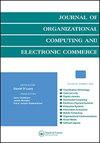群体表现如何影响用户在网络社区中的贡献?一个跨级别的调节模型
IF 1.9
4区 管理学
Q3 COMPUTER SCIENCE, INFORMATION SYSTEMS
Journal of Organizational Computing and Electronic Commerce
Pub Date : 2020-02-12
DOI:10.1080/10919392.2020.1718457
引用次数: 9
摘要
摘要在线社区管理者正在寻求有效的方法来鼓励用户表现出亲社会行为,以帮助维持在线社区的发展和有效性。一种策略是建立小团体来建立关系和促进沟通。除了在所有社区用户之间形成和共享的社会规范外,个人还受到同龄人的潜在影响,他们在群体内直接与同龄人交流。本研究将社会交换理论与群体影响理论相结合,研究在信息和规范两类群体影响下,声誉和互惠对用户贡献的影响是如何改变的。基于对一个在线社区中72个小组的3000多名成员的纵向观察,我们开发了一个跨级别的调节模型,以丰富我们对用户在群体表现影响下的贡献行为的理解。这项研究为在线社区管理员创建和培养有效的知识贡献和交流社区提供了指导。本文章由计算机程序翻译,如有差异,请以英文原文为准。
How do group performances affect users’ contributions in online communities? A cross-level moderation model
ABSTRACT Online community managers are seeking effective ways to encourage users to exhibit prosocial behaviors that help sustain the growth and effectiveness of online communities. One tactic is to set up small groups to build relationships and facilitate communications. In addition to social norms formed and shared among all community users, individuals are also subjected to potential influence from peers with whom they directly communicated within the group. This study integrated social exchange theory with group influence theory to investigate how the influences of reputation and reciprocity on users’ contributions were modified under two categories of group influences, i.e., informational and normative influence. Based on a longitudinal observation of over 3,000 members from 72 subgroups in an online community, we developed a cross-level moderation model to enrich our understanding of users’ contribution behavior with the influence of group performances. This study provides guidelines for online community administrators to create and foster effective communities for knowledge contribution and exchange.
求助全文
通过发布文献求助,成功后即可免费获取论文全文。
去求助
来源期刊

Journal of Organizational Computing and Electronic Commerce
工程技术-计算机:跨学科应用
CiteScore
5.80
自引率
17.20%
发文量
7
审稿时长
>12 weeks
期刊介绍:
The aim of the Journal of Organizational Computing and Electronic Commerce (JOCEC) is to publish quality, fresh, and innovative work that will make a difference for future research and practice rather than focusing on well-established research areas.
JOCEC publishes original research that explores the relationships between computer/communication technology and the design, operations, and performance of organizations. This includes implications of the technologies for organizational structure and dynamics, technological advances to keep pace with changes of organizations and their environments, emerging technological possibilities for improving organizational performance, and the many facets of electronic business.
Theoretical, experimental, survey, and design science research are all welcome and might look at:
• E-commerce
• Collaborative commerce
• Interorganizational systems
• Enterprise systems
• Supply chain technologies
• Computer-supported cooperative work
• Computer-aided coordination
• Economics of organizational computing
• Technologies for organizational learning
• Behavioral aspects of organizational computing.
 求助内容:
求助内容: 应助结果提醒方式:
应助结果提醒方式:


